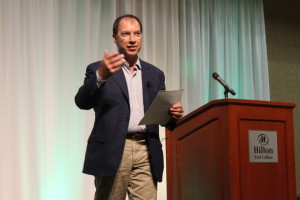
Faculty at universities around the country carry out billions of dollars’ worth of research projects each year. But what happens when funding for a particular project runs out?
Russ Korte, an associate professor in the School of Education at Colorado State University, is working to infuse a spirit of entrepreneurship into researchers’ innovations specifically related to engineering education through a project called I-Corps-L (Innovation Corps for Learning). The project is funded by the National Science Foundation, and is designed to help researchers get their ideas out to a broader audience. This effort is a national project involving researchers from a variety of universities around the country.
I-Corps-L provides practical application and real-world training in entrepreneurial skills modeled after the Lean LaunchPad courses developed by Steve Blank at Stanford University.
“Funders spend millions, or billions, in supporting research, but once the project is over, it tends to disappear. It doesn’t become widely disseminated or adopted,” Korte said. “The whole idea is to foster scalability and sustainability of these innovations that have been funded. What we’re doing is adapting a business course that came out of the start-up culture of Silicon Valley for helping new ventures get off the ground. Innovators and entrepreneurs take their idea and develop it into a marketable business.”
Applicable to education
Korte explained that the project is relevant to his field of education.
“These educational researchers have developed innovations in educational content, methods, or an educational product,” he said. “Then they learn how they get those innovations disseminated, scaled up, and used more broadly than just within their research project.”
The growing community of engineering education research brings with it the focus of improving education in engineering via more innovative practices, he added.
Korte is part of an instructor team charged with facilitating this entrepreneurship in engineering education researchers.
“What we do is present entrepreneurial knowledge and skills, and develop those skills by getting out of the classroom and in front of potential users,” Korte said. “Participants report back every week and we give them feedback. The workshop lasts seven weeks, and begins with a session of face-to-face instruction, then five weeks of online instruction and facilitation before the closing workshop.”
‘Entrepreneurial mindsets’
“We are developing entrepreneurial mindsets in faculty and graduate student researchers in engineering education,” Korte explained, adding that without some direction, these future innovators may not know how to effectively get their ideas off the ground. “You can imagine that unless they’ve actually been through a startup experience, they might not have the skills or knowledge to go about getting their idea to market. We help them develop these skills.”
“One of the things they’re required to do is to explore potential business models as a way of finding the best model for their innovation and market,” he said, explaining that these are skills that people in the field may not have spent a great deal of time learning in their profession as faculty doing academic research. “I-Corps-L helps train researchers to be sensitive to, and adept at, going out and finding customers, and finding out what customers need so they can modify their product or invention to meet the needs of a broader market for innovative educational practices and products.”
Korte is very optimistic about what the future will bring to innovators involved with I-Corps-L. “This is a new venture for the NSF and the area of engineering education, to start thinking differently about the research being done, and how to make an impact. How to improve education for engineers, but in a much bigger way than they’ve been able to do.”
The next I-Corps-L cohort begins in January 2015.